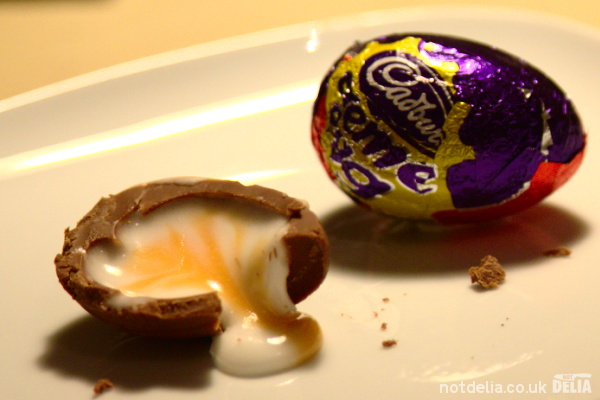Now that Easter is almost upon us, we thought it would be fun to taste a few Easter eggs – any excuse to eat more chocolate! Perhaps the good old fashioned chocolate egg familiar to so many of us since childhood – the Cadbury Creme Egg – would be a good place to start. But wait.
Earlier this year there was anguish over changes to the famous Cadbury Creme Egg, a much loved favourite since its launch in its current form in 1963, although Cadbury had been making filled chocolate eggs since 1923. It’s no longer the same egg that so many of us will remember. On Monday 12 January 2015, Cadbury announced that the eggs were no longer made with Cadbury’s Dairy Milk chocolate.
What’s in a Cadbury Creme Egg and why the hullabaloo about the changes?
The eggs used to be made from Cadbury’s Dairy Milk chocolate filled with fondant, ie just sugar and colouring. Now they’re using a different type of chocolate. Some would describe it as inferior, and it’s thought to suit the American palate and its penchant for a sweeter chocolate, since Cadbury was taken over by Kraft Foods (now Mondelēz) in 2010.
Is the chocolate now inferior?
The chocolate that’s now being used for the Creme Egg apparently contains a lot more butyric acid and it’s this different chocolate which is the focus of much of the distaste about the new recipe.
People think it’s because it’s sweeter, and it is, but it’s because they use a different milk powder that it tastes different. Theirs contains a lot of butyric acid, which is the main smell of human vomit.
(The Guardian, 18 March 2015: Who needs Creme Eggs when you can make your own Creem Eggs?)
Some of the reaction is good old-fashioned kneejerk, an instinctive rejection of a big bad US-owned conglomerate tampering with a British childhood icon. Several of the more heavyweight newspapers ran articles expressing tongue-in-cheek outrage at the change. One contained this gem: “Without the Dairy Milk shell – and I say this without having tried the new product, obviously – we are left with nothing less than an abomination.”
So, can they really be so bad? We decided to try.
The tasting
In the event it turned out to be fairly ordinary chocolate filled with liquid sugar. OK for a sweet fix for the undiscerning, such as children who’ve yet to develop a more sophisticated palate. I personally found it teeth-curlingly sweet, but did not notice any smell of human vomit. Perhaps the extract of paprika (listed in the ingredients) disguised that. Really, I found nothing wrong with it, if you like that kind of thing. For me, there was nothing particularly right with it either.
Don’t get me wrong, there are lots of Cadbury’s products which I do like, such as their Fruit & Nut bar. And I also enjoy a bit of nostalgia. I like a Flake in my ice cream sometimes and am also rather partial to a Crunchie. Not so long ago our taste team likened Magnum’s Crème Brûlée edition to a Crunchie and, dare I say it, in some ways preferred the taste of the latter.
Overall, most of what Cadbury produces is at the high end of the mass market and deservedly popular. I just didn’t love their Creme Eggs. And no wonder, when you compare them with affordable luxury such as the Crème de la Crème eggs produced by Artisan du Chocolat, which I tried next. To be fair, the Cadbury eggs are only 50p each, whilst the upmarket Artisan du Chocolat eggs work out at £1.50 each.

Leave a Reply
You must be logged in to post a comment.